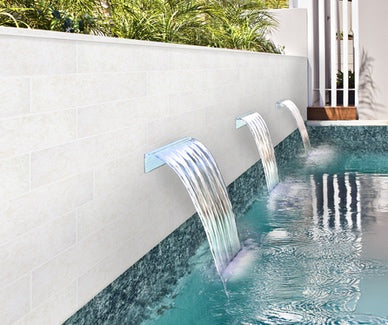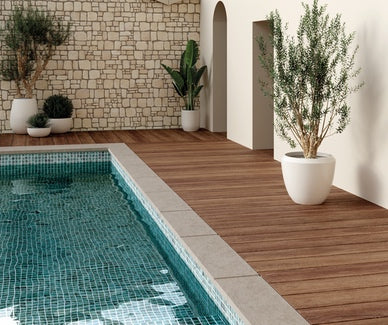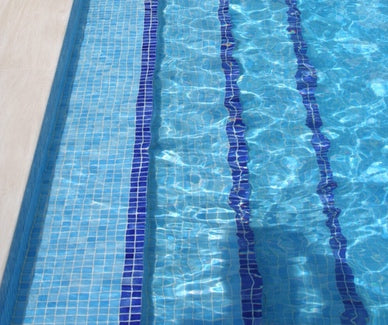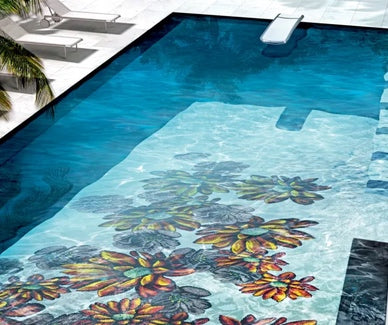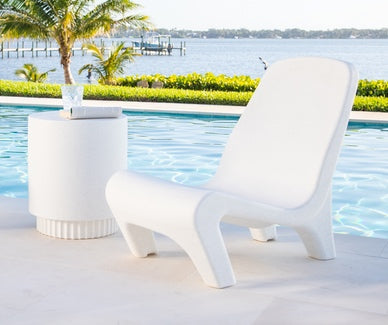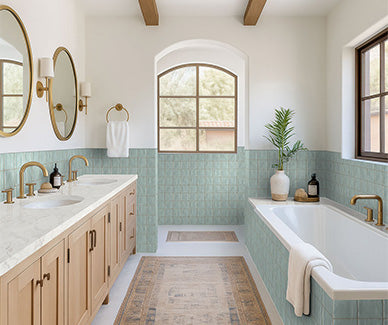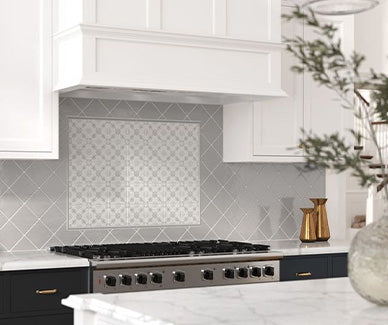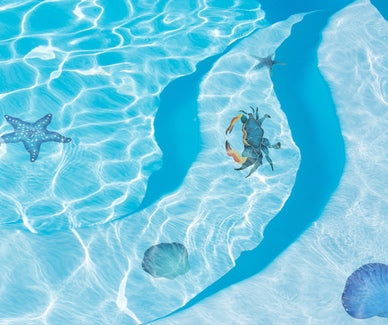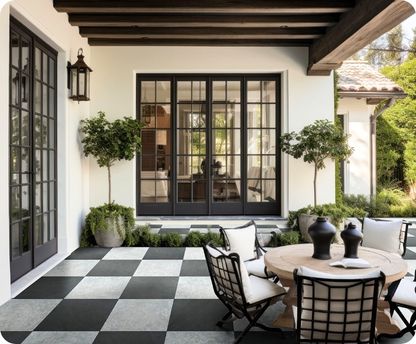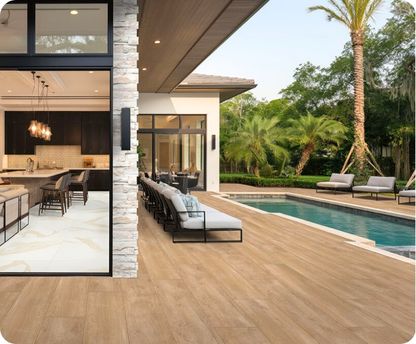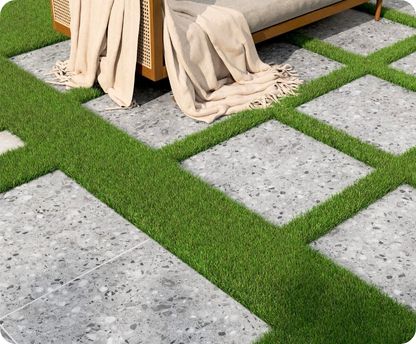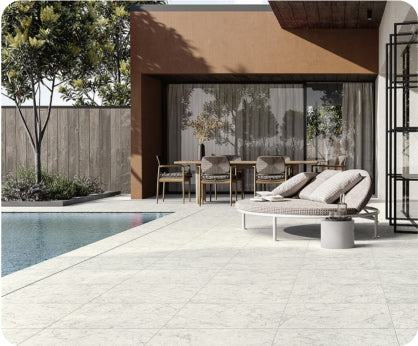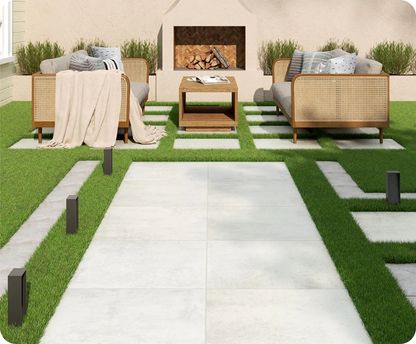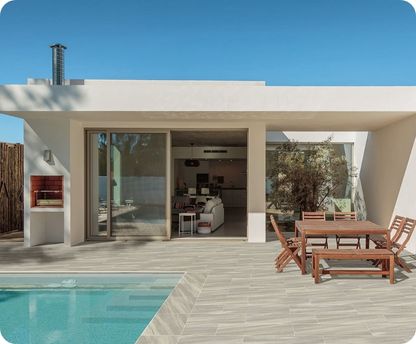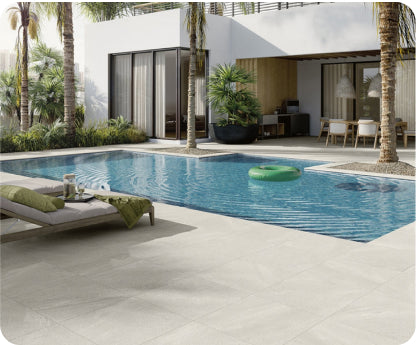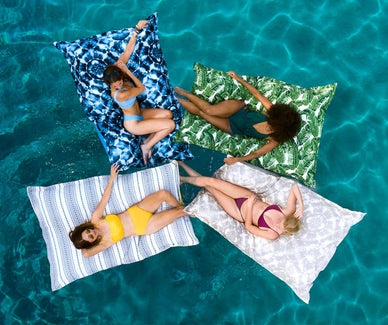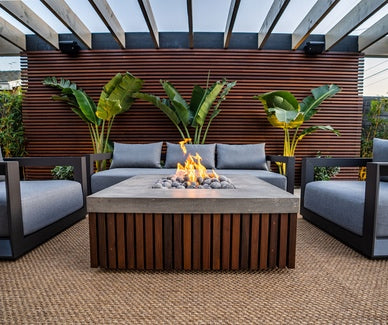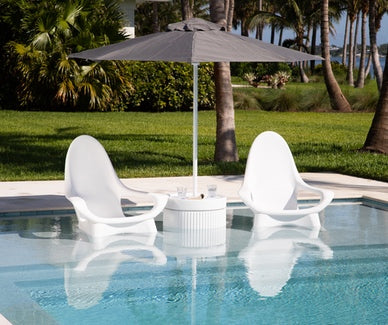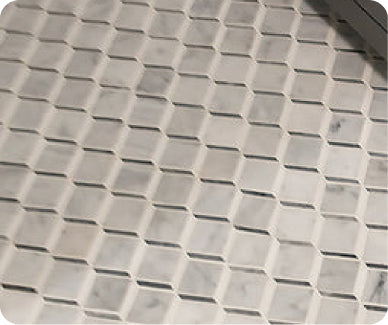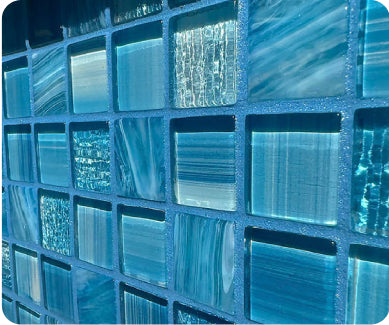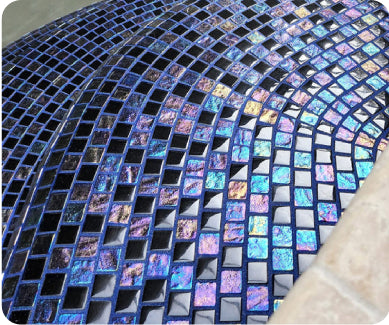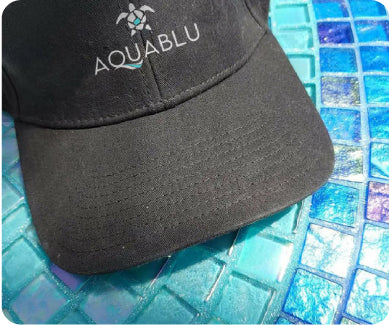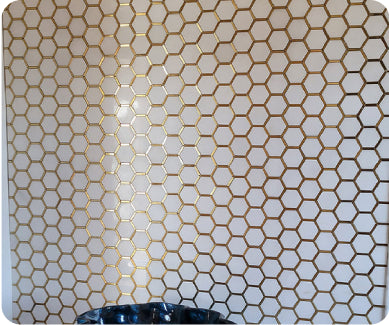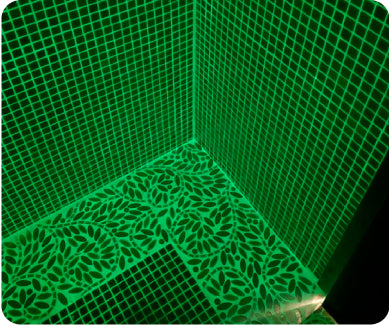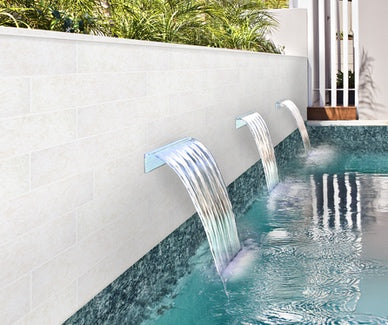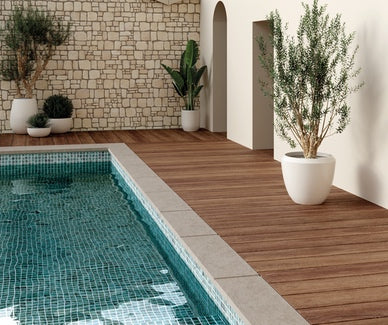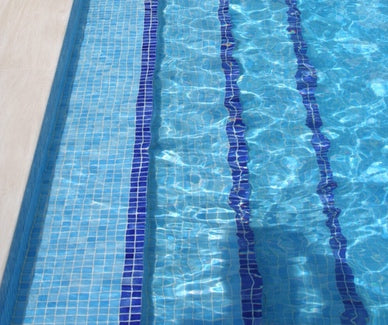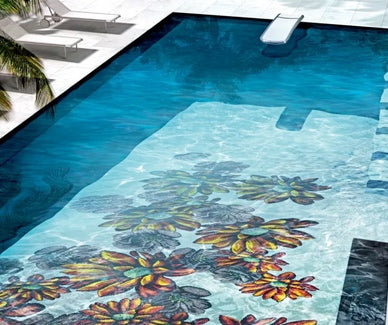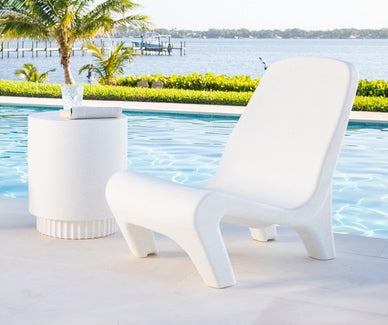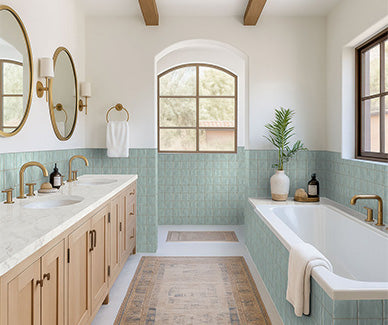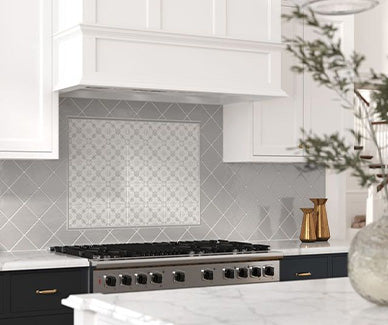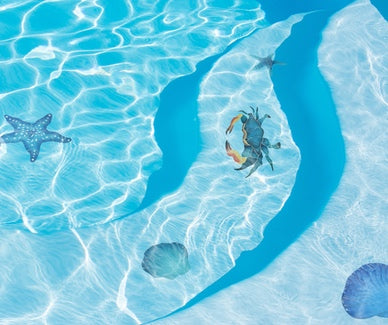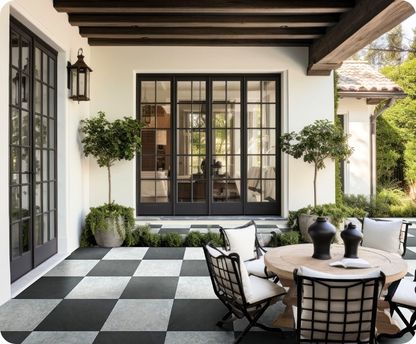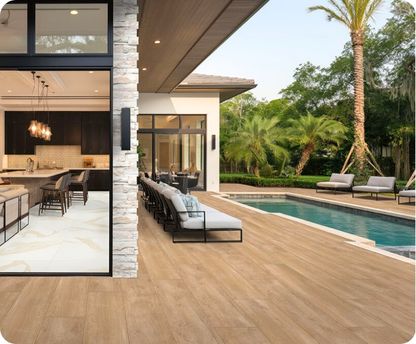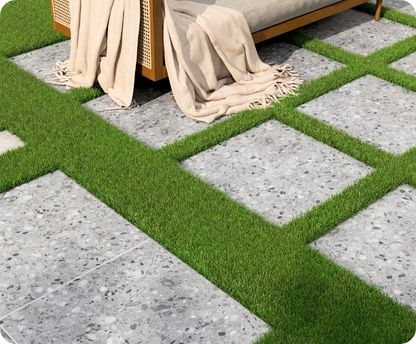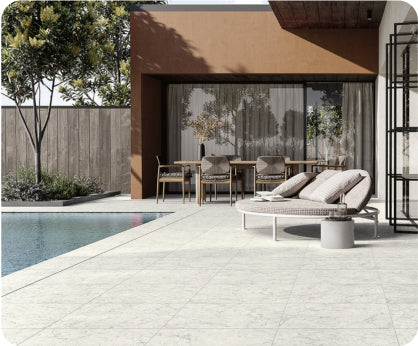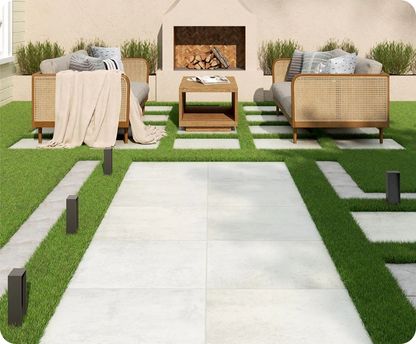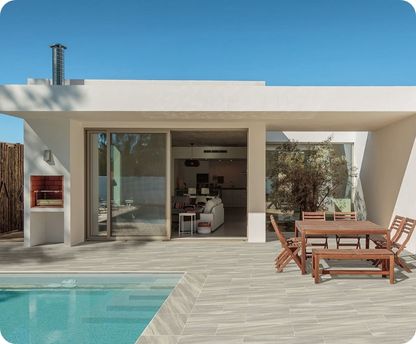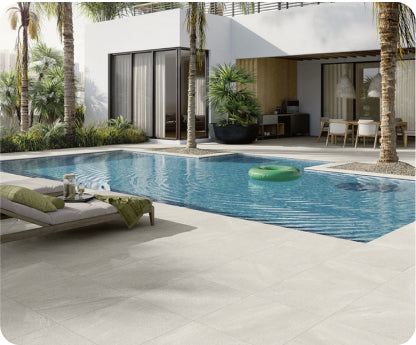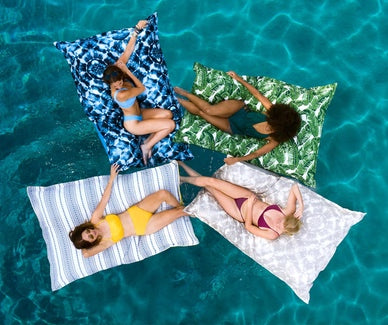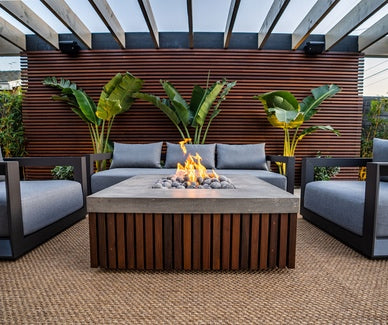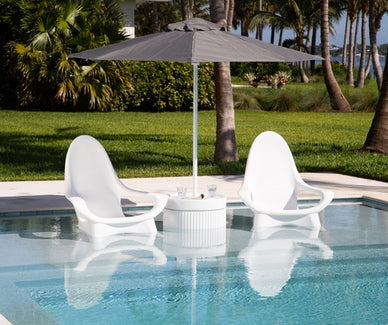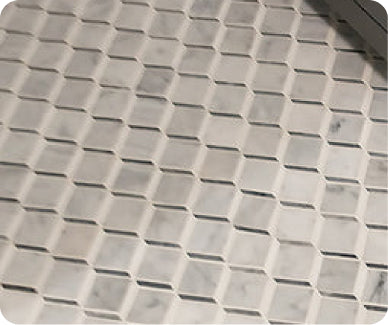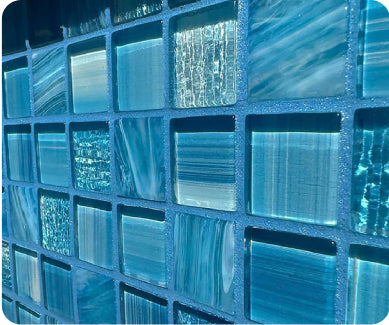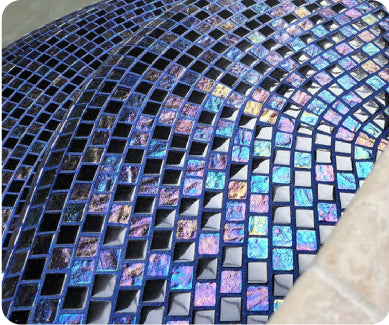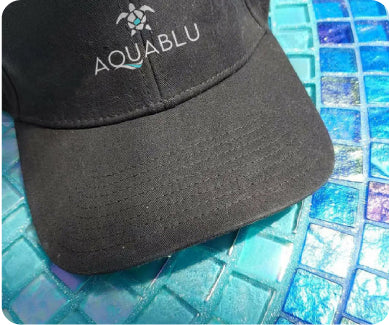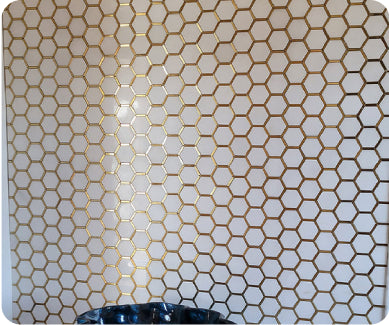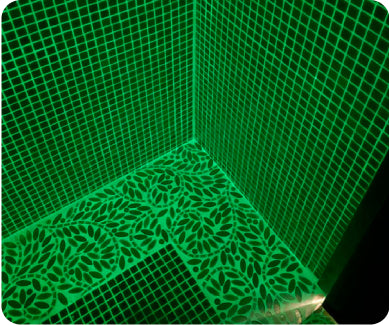The Great Tile Debate: Glossy vs. Matte Outdoors

Choosing the right tile for your outdoor space is a significant decision that impacts not only the aesthetics but also the safety and longevity of your patio, pool area, or walkway. Among the myriad of choices available, the debate between glossy and matte finishes stands out. Each brings its own set of advantages and considerations to the great outdoors. Let's dive into the characteristics of both, explore how they perform in various outdoor settings, and feature some stunning options from AquaBlu Mosaics that will help you make an informed decision.
Understanding the Finishes: Glossy vs. Matte
When we talk about tile finishes, we're primarily referring to the surface texture and how it interacts with light.
Glossy Tiles: The Dazzling Appeal
Glossy tiles are characterized by their smooth, reflective surface. They have a polished, elegant look that can add a touch of luxury and sophistication to any space. The high sheen of glossy tiles reflects light beautifully, making spaces appear brighter and more expansive.
Pros of Glossy Outdoor Tiles:
Aesthetic Appeal: The primary draw of glossy tiles is their dazzling, high-end appearance. They can create a "wow" factor, especially when used around pools or in areas where you want a vibrant, reflective surface.
Easy to Clean (Surface Dirt): Their smooth surface makes them relatively easy to wipe down and clean surface dirt, dust, and light debris.
Light Reflection: They enhance natural light, making smaller outdoor areas feel larger and more open.
Cons of Glossy Outdoor Tiles:
Slipperiness: This is perhaps the most significant drawback for outdoor use. When wet, glossy tiles can become very slippery, posing a fall risk, especially around pools, patios, or in areas prone to rain.
Shows Scratches and Smudges: Their reflective nature means that scratches, scuffs, and smudges are more noticeable. This can be a concern in high-traffic outdoor areas.
Glare: In direct sunlight, glossy tiles can produce significant glare, which can be uncomfortable for the eyes.
Less Durable Against Heavy Impact: While some glossy tiles are durable, the finish itself can chip more visibly than a matte finish if subjected to heavy impact.
Matte Tiles: The Understated Elegance
Matte tiles, in contrast, have a non-reflective, low-sheen surface. They offer a more understated, natural, and earthy appeal, often preferred for their practicality and contemporary look.
Pros of Matte Outdoor Tiles:
Superior Slip Resistance: This is their most significant advantage for outdoor applications. The textured surface provides better grip, making them a safer choice around wet areas like pools, spas, and pathways that might get wet from rain or irrigation.
Durability and Concealment: Matte finishes are excellent at hiding dirt, smudges, and minor scratches, making them ideal for high-traffic areas. They tend to look cleaner for longer and are more forgiving of everyday wear and tear.
Reduced Glare: Their non-reflective surface means no blinding glare from the sun, providing a more comfortable visual experience outdoors.
Natural Aesthetic: Matte tiles often mimic natural materials like stone or wood more effectively, contributing to a cohesive, organic outdoor design.
Cons of Matte Outdoor Tiles:
Cleaning (Textured Surface): While they hide dirt better, the textured surface of matte tiles can sometimes make deep cleaning a bit more challenging, as dirt can settle into the grooves.
Less Reflective: They don't reflect light as much as glossy tiles, which means they won't make a space feel larger or brighter.
Can Appear Darker: In shaded areas, matte tiles might absorb more light and appear darker, potentially making a space feel cozier rather than expansive.
Featured AquaBlu Mosaics Products for Your Outdoor Oasis
AquaBlu Mosaics offers a diverse range of tiles suitable for various outdoor applications. Let's explore some of their products that align with the glossy vs. matte debate and their suitability for your specific outdoor needs.
Dazzling Glossy Options
While slip resistance is paramount for outdoor areas, some glossy tiles are specifically designed or recommended for submerged areas like pool interiors where slipperiness is less of a concern on surfaces meant for walking, or in areas with very minimal foot traffic.
- High Tide Sky Blue, 1" x 1" Glass Tile: This beautiful glass tile boasts a unique process that infuses glitter, creating an elegant shimmer. It's ideal for both indoor and outdoor applications, making it a stunning choice for pool interiors, waterlines, or decorative accents where its reflective quality can truly shine. Its small size also contributes to more grout lines, which can provide a minimal amount of additional grip, though its primary appeal is its visual effect in water.
- Stratus Gray, 2" x 4" Subway Tile: A refined interpretation of classic glass subway tile, the Stratus Gray offers a sleek aesthetic. It's described as frost-proof and ideal for both interior and exterior spaces. While a glass tile, its application might be best suited for outdoor vertical surfaces like decorative walls or features, or for waterlines in pools where its sophisticated look can be appreciated without extensive foot traffic concerns.
- Whitestone, Triangle Mosaic Tile: Part of the Treasure Collection by Aquatica, this glass mosaic tile features an iridescent finish, adding a captivating play of light. Crafted from durable glass, it is rated for use in pools and spas. This makes it an excellent choice for adding a unique, shimmering design element to submerged pool surfaces, water features, or spa interiors where its artistic shape and reflective quality can create a luxurious ambiance.
Practical Matte & Natural Stone Options
For most outdoor areas, especially those involving foot traffic and exposure to moisture, matte and naturally textured options are generally recommended for their inherent safety and durability.
- Tahiti Turquoise Slip Resistant, 6" x 6" Porcelain Tile: This porcelain tile is a prime example of a fantastic outdoor choice. It features a matte finish and is specifically designed to be slip-resistant. Being frost-proof and capable of withstanding changing weather conditions, it's an excellent option for pools, spas, patios, and other outdoor spaces where safety is a top priority. It's beautiful turquoise color can evoke a serene, tropical feel.
- Nature Matte Sea Salt, 1.5" x 1.5" Glass Tile: Crafted from 100% recycled glass, this tile offers a beautiful matte finish. Its frost-proof nature makes it suitable for various outdoor applications, including pool waterlines, spas, and fountains. While it's a glass tile, its matte finish enhances its grip compared to glossy glass, making it a safer option for submerged areas or water features where a natural, subtle aesthetic is desired.
- Golden White Flagstone Pavers: While not a tile in the traditional sense, these natural stone pavers are an excellent matte-finished option for outdoor landscaping. Crafted from Quartzite, they feature unique textures and earthy tones, providing a rugged yet elegant look. They are ideal for patios, pathways, and garden borders, offering superior natural slip resistance due to their inherent texture. It's important to note they are not recommended for use in submerged areas.
Making Your Decision: Considerations for Outdoor Spaces
When deciding between glossy and matte tiles for your outdoor project, several factors should guide your choice:
1. Safety First: Slip Resistance: For any outdoor area that will experience foot traffic, especially if it's exposed to water (rain, pool splashes, irrigation), slip resistance should be your paramount concern. Matte tiles, and specifically those rated as "slip-resistant," are almost always the safer choice. Glossy tiles are generally best reserved for vertical surfaces or submerged pool interiors where walking on them isn't the primary function.
2. Climate and Weather Conditions:
- Rain and Moisture: If you live in an area with frequent rain or high humidity, matte tiles will provide better traction when wet.
- Sunlight and Glare: In sunny climates, the glare from glossy tiles can be intense and uncomfortable. Matte tiles absorb light, reducing this issue.
- Temperature Fluctuations: Ensure any tile you choose for outdoors is "frost-proof" or "freeze-thaw resistant" to prevent cracking in colder climates. All the featured AquaBlu Mosaics tiles suitable for outdoor use boast this characteristic.
3. Maintenance and Upkeep:
- Dirt and Smudges: Matte tiles are more forgiving when it comes to hiding dirt, dust, and smudges, which is a significant advantage for outdoor areas constantly exposed to elements.
- Cleaning Frequency: While both require cleaning, matte tiles might allow you to go longer between deep cleans without appearing visibly dirty. Glossy tiles, while easy to wipe, will show every water spot or footprint.
4. Aesthetic Vision and Style:
- Modern and Sleek: Glossy tiles can lean towards a more contemporary, luxurious, or even glamorous aesthetic, often chosen for a dramatic effect around pools or as statement pieces.
- Natural and Rustic: Matte tiles often complement more natural, earthy, or industrial design styles. They blend seamlessly with landscaping and provide a grounding presence.
- Seamless Transition: If you're looking for a seamless indoor-outdoor transition, consider the finish of your indoor flooring and how the outdoor tile will complement it.
5. Traffic Levels:
- High-Traffic Areas: Patios, main pathways, and pool decks that see a lot of foot traffic will benefit from the durability and forgiving nature of matte tiles.
- Low-Traffic/Decorative Areas: For accent walls, decorative features, or areas not meant for regular walking, glossy tiles might be considered for their visual impact.
6. The Role of Grout: The type and width of grout lines also play a role in slip resistance. Wider, textured grout lines can provide additional grip, regardless of the tile's finish. However, relying solely on grout for safety is not advisable; the tile's inherent slip resistance is key.
Installation and Longevity Considerations
Beyond the finish, proper installation is critical for the longevity of any outdoor tile. Ensure that:
- Substrate Preparation: The base for your tiles is properly prepared, stable, and allows for adequate drainage.
- Adhesive and Grout: Use outdoor-rated, frost-proof adhesives and grouts that can withstand temperature fluctuations and moisture.
- Slope for Drainage: Outdoor tiled areas should have a slight slope to ensure water runs off and doesn't pool, which can lead to issues like efflorescence, mold growth, or freeze-thaw damage.
- Expansion Joints: Proper expansion joints are essential to accommodate the natural expansion and contraction of tiles due to temperature changes, preventing cracking.
Even the most durable tiles will benefit from regular maintenance. Sweeping away debris, occasional washing with a mild cleaner, and promptly addressing any minor damage can significantly extend the life and beauty of your outdoor tiling.
The Verdict
Ultimately, the choice between glossy and matte outdoor tiles hinges on your priorities. If safety, durability, and low-maintenance appeal are at the top of your list for walked-upon surfaces, matte tiles (especially those with slip-resistant properties like AquaBlu's Tahiti Turquoise Porcelain Tile or Nature Matte Sea Salt Glass Tile, or natural stone options like the Golden White Flagstone Pavers) are the clear winner. They offer peace of mind and a practical, stylish solution for most outdoor living spaces.
However, if you're looking to create a dazzling visual statement in a submerged area like a pool interior or a vertical accent wall where slip resistance isn't a concern for foot traffic, glossy tiles (such as AquaBlu's High Tide Sky Blue or Whitestone Triangle Glass Tile) can deliver unparalleled brilliance and luxury.
For a comprehensive approach, consider combining both. Matte tiles for the main walking areas and glossy accents in features or submerged zones can create a dynamic and safe outdoor environment that truly reflects your style. No matter your choice, AquaBlu Mosaics provides beautiful, high-quality options to transform your outdoor vision into a stunning reality.
FAQ: The Great Tile Debate: Glossy vs. Matte Outdoors
Q1: Which tile finish is safer for outdoor patios and pool decks? A1: For outdoor patios and pool decks, matte-finished tiles are generally much safer due to their superior slip resistance, especially when wet. Their textured surface provides better grip compared to smooth, glossy tiles. Look for tiles specifically labeled as "slip-resistant" for these areas.
Q2: Will glossy tiles cause glare in direct sunlight? A2: Yes, glossy tiles have a highly reflective surface and can cause significant glare in direct sunlight. This can be uncomfortable for the eyes and potentially reduce visibility. Matte tiles, with their non-reflective surface, are a better choice to minimize glare.
Q3: Are all glass tiles suitable for outdoor use? A3: Not all glass tiles are suitable for all outdoor applications. While many glass tiles, like those from AquaBlu Mosaics (e.g., High Tide Sky Blue, Stratus Gray, Nature Matte Sea Salt, Whitestone Triangle), are frost-proof and designed for outdoor use, including submerged areas like pools, their primary use on outdoor walking surfaces (patios, decks) might be limited due to their inherent slipperiness when wet, especially for glossy finishes. Always check the manufacturer's recommendations for specific outdoor applications.
Q4: Do matte tiles show dirt less than glossy tiles? A4: Yes, matte tiles are much better at hiding dirt, dust, smudges, and minor scratches compared to glossy tiles. Their non-reflective, often slightly textured surface makes imperfections and general grime less noticeable, which is a significant advantage for outdoor environments.
Q5: Can I use glossy tiles in my swimming pool? A5: Yes, glossy tiles are commonly used in swimming pools, particularly for the interior surfaces or waterlines. In submerged areas, the slipperiness issue is less of a concern than on walking surfaces, and their reflective quality can create a stunning visual effect with the water. Always ensure the glossy tile is specifically rated for submerged use and is frost-proof.
Q6: What is the best tile material for outdoor use? A6: Porcelain tile and natural stone (like Quartzite pavers) are often considered among the best materials for outdoor use due to their durability, low porosity, and ability to withstand weather elements. Both can come in various finishes, including matte, which is ideal for slip resistance. Glass tiles are also excellent for specific outdoor applications like pool interiors and waterlines if they are frost-proof and designed for such use.
Q7: How do I clean outdoor tiles? A7: The cleaning method depends on the tile material and finish. Generally, regular sweeping or hosing down helps remove loose dirt. For deeper cleaning, use a mild, pH-neutral cleaner designed for outdoor tiles and a soft brush or mop. For textured or matte tiles, a stiffer brush might be needed for grout lines. Always rinse thoroughly. Avoid harsh chemicals or abrasive cleaners, especially on glossy surfaces, as they can damage the finish.
Q8: Are "slip-resistant" tiles truly safe? A8: Tiles labeled as "slip-resistant" are designed and tested to provide a higher level of traction, making them much safer for outdoor applications where moisture is present. While no surface is entirely "slip-proof," these tiles significantly reduce the risk of slips and falls, especially when compared to non-slip-resistant options.

